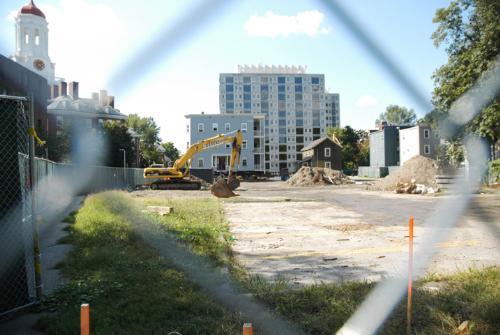
News
Summers Will Not Finish Semester of Teaching as Harvard Investigates Epstein Ties

News
Harvard College Students Report Favoring Divestment from Israel in HUA Survey

News
‘He Should Resign’: Harvard Undergrads Take Hard Line Against Summers Over Epstein Scandal

News
Harvard To Launch New Investigation Into Epstein’s Ties to Summers, Other University Affiliates

News
Harvard Students To Vote on Divestment From Israel in Inaugural HUA Election Survey
City Nixes Permit To Divert Traffic

Increasing the decibels and distractions that students near the Cowperthwaite Street construction will have to endure, City Manager Robert W. Healy last week declined to renew a Harvard permit which would have diverted noisy truck traffic away from the River Houses to nearby Banks and Grant Streets.
Though Harvard had secured such an arrangement last spring, the City withdrew approval after neighbors successfully petitioned Cambridge to confine construction trucks to Cowperthwaite Street, which is owned completely by the University, and abuts Mather, Dunster, and Leverett Houses.
The City originally planned to allow the arrangement to expire Sept. 15, but the University negotiated an extension to avoid having trucks on Cowperthwaite during move-in, said Thomas J. Lucey, Harvard’s director of community relations for Cambridge.
“The City has a general practice of working with entities that are involved with development to have the construction activity contained within their site,” said Harvard’s Senior Director of Community Relations Mary H. Power.
Erin M. M. Wattie ’06, a Dunster resident who serves as a representative for students affected by the construction, sent an e-mail yesterday over the Dunster House open list denouncing the City’s move.
“This would mean 100 percent of the truck traffic would pass through Cowperthwaite Street and would result in a big yellow concrete wall being erected which would divide Cowperthwaite in half,” she wrote.
“This will make the street very narrow, not to mention ugly, and would have 100 percent of the trucks making noise right outside K Entry,” she wrote, referring to the Dunster House entryway that directly faces Cowperthwaite.
But neighbors, who first presented their petition to the City on Aug. 1 and made another plea on Sept. 12, said that the decision “made complete sense,” because Cowperthwaite Street provides the most direct access to the site.
“There’s no reason that Harvard shouldn’t be getting trucks onto their property as quickly as possible,” said resident Alan Joslin, who serves on a coalition of city residents and officials that oversees the construction process.
“Any disturbances felt on the part of students and the University should be mitigated, but not on the backs of anyone else,” he said.
Joslin expressed dismay that the truck routes were pitting neighbors against students instead of allowing them to unite around issues of start time and noise level.
“I’d love it if we could all get coordinated rather than letting Harvard Real Estate put a wedge between us,” Joslin said.
Students and residents say they already are affected by the early-morning “beep-beep” of trucks travelling to and from the site.
“I sit in my room and the noise perturbs me as I do my work,” said John B. Freese ’06, who lives on the third floor of Dunster House F entryway. “I definitely have to turn my music up higher, too.”
Wattie and three Undergraduate Council representatives, Aaron D. Chadbourne ’06, Lauren P.S. Epstein ’07, and Matthew R. Greenfield ’08, met with Deputy Dean of the College Patricia O’Brien and Dean of the Faculty William C. Kirby in May and persuaded the administrators to replace the windows on the east side of Leverett G tower with double-paned windows to mitigate noise effects.
They are reconvening today with O’Brien and other Harvard representatives for further discussion on how to mitigate the effects of the construction.
—Staff writer Katherine M. Gray can be reached at kmgray@fas.harvard.edu.
—Staff writer Natalie I. Sherman can be reached at nsherman@fas.harvard.edu.
Want to keep up with breaking news? Subscribe to our email newsletter.
